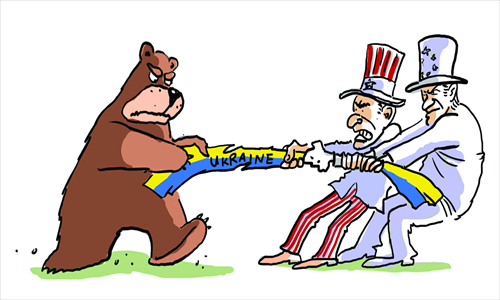Ukraine wedged between Russian and EU interests

Illustration: Liu Rui/GT
A dramatic scene unfolded at the summit of the EU's Eastern Partnership initiative held in Vilnius in late November.
Ukraine, at the very last minute, changed its mind about the signing of the EU-Ukraine Association Agreement, also known as the Deep and Comprehensive Free Trade Agreement. Prior to this, Ukraine President Viktor Yanukovych had a private talk with Russian President Vladimir Putin.
Russian public opinion views Ukraine's choice as a key criterion when evaluating Russia's Eurasian foreign policies, which have been strategically unsound since the dissolution of the former Soviet Union. Meanwhile, the West believed that Ukraine would finally choose to align with the EU.
Ukraine seems to be taking the initiative, which means both Russia and the EU need to step up their game. During the Vilnius summit, Ukraine raised five proposals and many European leaders showed their understanding.
In terms of Russia, the country, since 2011, has tried to woo Ukraine to join its Eurasian Integration project and provided favorable incentives.
In a certain sense, the tragic competition between major powers has led to the comedic result of small- and medium-sized countries like Ukraine gaining an advantage.
Undoubtedly, the unprecedented opportunity Ukraine faces now is because of the intensifying rivalry between Russia and the West, both of which are paying high costs. From the strategic perspective of Eurasia as a whole, the question of whom Ukraine will side with will be the key to the balance of power between Russia and the West in the region.
Since NATO and Europe expanded eastward, Ukraine has become, besides Belarus, the only buffer zone and strategic shield in Russia's western border.
Meanwhile, Russia's geopolitical and economic domain in the post-Soviet era has gradually become fragmented. Its primary interest is maintaining long-standing Russian-Ukrainian relations so as to stop the West from marching eastward, and ensure its status as a world power.
As for the West, it views Ukraine as a frontier through which it can squeeze Russia's strategic space.
Facing the "gracious invitations" from both the West and the East, Ukraine neither has the intention of refusing, nor is able to. Its leadership is now striking a balance between the two so as to gain more economic benefit.
There is nothing wrong with such a choice, but the problem is that both Russia and the EU do not accept Ukraine's move of "hitting two birds with one stone." Ukraine's efforts to win advantages from both sides also make it face pressures from both sides.
The EU has already reminded Ukraine that it cannot join the free trade zone with the EU and the Russia-led Eurasian economic union at the same time. Russia also warned Ukraine that if it signs the Association Agreement with the EU, it will not have membership in the economic union.
It is a sorrowful result for the EU that the Ukraine rejected it at the Vilnius summit because Ukraine is the core of its "Eastern Partnership" plan initiated in 2009. Nonetheless, Russia is not the eventual winner, as Yanukovych himself once said his country's path of integration with the EU was a historical certainty.
It can be imagined that Russia and the EU or the entire West will be engaged in rivalry regarding Ukraine in the foreseeable future. Both may provide more attractive integration plans. The Ukrainian presidential elections in 2015 are likely to be the core battlefield for this competition.
As a country in-between powers, the best choice for Ukraine is to strike a balance between the West and the East. Pitifully, it is not allowed to do so.
The emerging more pro-Western identity among the public in Ukraine perhaps is the biggest challenge in terms of the middle-and-long-term prospects for the Putin regime, as it may tilt the strategic balance between Russia and the EU.
Ukraine may eventually choose the EU, but it doesn't necessarily mean this will benefit it. Rather, it may cause another round of tragedies for it.
The author is deputy director of the Center for Russian Studies, School of Advanced International and Area Studies, East China Normal University. opinion@globaltimes.com.cn
Related article: West still pushing democracy in former Soviet republics